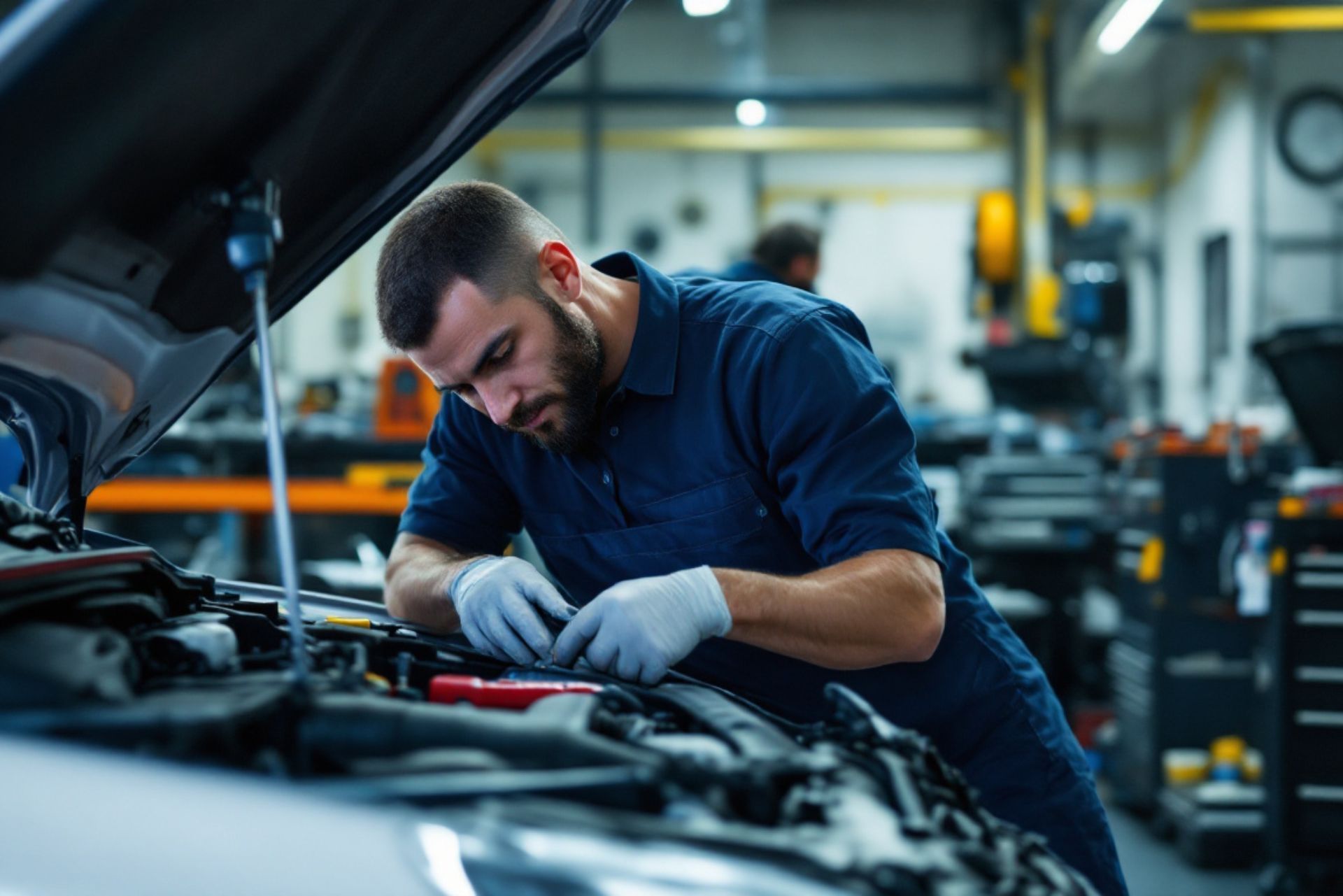Arizona Auto Service & Repair Insurance
See How We're Different:
or Call Us:(480) 526-3222

Most Common Business Policies
Index
Contact Us
In the bustling landscape of Arizona's automotive industry, auto service and repair businesses play a crucial role in keeping vehicles safe and operational. However, like any business, these establishments face various risks that can lead to significant financial losses. This is where auto service and repair insurance comes into play. Understanding the ins and outs of this insurance is essential for business owners in the automotive sector to safeguard their investments and ensure smooth operations.
Understanding Auto Service & Repair Insurance
Auto service and repair insurance is specifically designed to protect businesses that offer automotive repair and maintenance services. This type of insurance covers various risks associated with the industry, from property damage to liability claims. It is essential for business owners to comprehend the different components of this insurance to make informed decisions about their coverage.
What Does Auto Service & Repair Insurance Cover?
The coverage provided by auto service and repair insurance can vary significantly depending on the policy and the insurer. Generally, it includes:
- General Liability: This protects against claims of bodily injury or property damage that may occur on the business premises or as a result of the services provided.
- Property Insurance: This covers damage to the physical location, equipment, and tools used in the repair process.
- Workers' Compensation: If employees are injured while working, this insurance covers medical expenses and lost wages.
- Garage Keepers Liability: This is crucial for businesses that store customers' vehicles, covering damages that may occur while the vehicle is in the shop's care.
Why Is It Important?
Having the right insurance coverage is vital for several reasons. Firstly, it protects the business from unexpected financial burdens that can arise from accidents or lawsuits. Secondly, it enhances the credibility of the business, as customers are more likely to trust a service provider that is insured. Lastly, it ensures compliance with state regulations, which often require businesses to carry certain types of insurance.
Moreover, auto service and repair insurance can also provide peace of mind for both business owners and their customers. Knowing that they are covered in the event of an accident allows business owners to focus on delivering quality service without the constant worry of potential liabilities. Additionally, customers may feel more secure leaving their vehicles in the care of a business that has comprehensive insurance coverage, as it demonstrates a commitment to professionalism and responsibility.
Furthermore, as the automotive industry continues to evolve with advancements in technology, having the right insurance becomes even more critical. With the rise of electric vehicles and sophisticated diagnostic tools, repair shops must adapt to new challenges and potential risks. Insurance policies can often be tailored to meet the specific needs of a business, ensuring that as the industry changes, the coverage remains relevant and effective. This adaptability is essential for long-term success in a competitive market.

Types of Coverage Available
Arizona auto service and repair insurance offers a variety of coverage options tailored to meet the specific needs of different businesses. Understanding these options can help business owners choose the right policy.
General Liability Insurance
General liability insurance is a foundational coverage that protects against a wide range of risks. It covers legal fees and damages if a customer is injured on the premises or if property damage occurs due to the business's operations. For instance, if a customer slips and falls in the shop, this insurance would cover the associated costs. Additionally, this type of insurance can also extend to cover claims related to advertising injuries, such as defamation or copyright infringement, which can be particularly relevant for businesses that engage in promotional activities or marketing campaigns.
Property Insurance
Property insurance is essential for any business that relies on physical assets. This coverage protects the building, tools, equipment, and inventory from risks such as fire, theft, or vandalism. In the automotive industry, where specialized tools and equipment can be costly, having property insurance can prevent significant financial losses. Furthermore, many policies can be customized to include coverage for business interruption, which can be crucial if a disaster temporarily halts operations, ensuring that the business can recover without facing crippling financial strain during downtime.
Workers' Compensation Insurance
Workers' compensation insurance is mandatory in Arizona for businesses with employees. This coverage provides financial support for workers who are injured on the job, covering medical expenses and lost wages. It also protects the business from lawsuits related to workplace injuries, making it a crucial aspect of any auto service and repair operation. Moreover, workers' compensation can also include rehabilitation services for injured employees, helping them return to work more quickly and effectively. This not only aids in employee recovery but also promotes a safer workplace culture, as businesses are incentivized to implement safety measures to reduce the risk of accidents and injuries.
Choosing the Right Insurance Provider
When selecting an insurance provider for auto service and repair insurance, several factors should be considered to ensure the best fit for the business's needs.
Assessing Coverage Options
Different insurance providers offer varying levels of coverage and types of policies. It is essential to assess the specific needs of the business and ensure that the chosen provider can meet those needs. Comparing multiple providers can also help identify the best coverage options at competitive rates. For instance, some providers may offer specialized coverage for certain types of repairs or services, such as collision repair or paintless dent removal, which can be crucial for businesses focusing on niche markets. Additionally, understanding the limits of coverage, such as the maximum payout for certain claims, can help in making an informed decision.
Evaluating Customer Service
Customer service is a critical aspect of any insurance provider. Business owners should look for a provider that offers responsive and knowledgeable support. This is particularly important when filing claims or needing assistance with policy details. Reading reviews and seeking recommendations can provide insights into a provider's customer service quality. Furthermore, it may be beneficial to inquire about the availability of dedicated account representatives who can provide personalized assistance. A provider with a strong customer service reputation often indicates that they prioritize their clients' needs, which can lead to a smoother experience during stressful situations like accidents or damages.
Understanding Policy Terms
Before signing any insurance policy, it is crucial to thoroughly understand the terms and conditions. This includes knowing what is covered, any exclusions, and the claims process. Taking the time to review the policy can prevent misunderstandings and ensure that the business is adequately protected. Additionally, it is wise to clarify any jargon or complex language with the insurance agent to avoid confusion later on. Some policies may also offer optional add-ons or endorsements that can enhance coverage, such as roadside assistance or rental car reimbursement, which could be beneficial depending on the business's operational needs. Understanding these details can empower business owners to make choices that align with their risk management strategies.
Cost of Auto Service & Repair Insurance
The cost of auto service and repair insurance can vary widely based on several factors, including the size of the business, the types of services offered, and the location. Understanding these factors can help business owners budget for their insurance needs. Additionally, it's important to recognize that the insurance landscape is continually evolving, with new policies and coverage options emerging that can impact overall costs.
Factors Influencing Insurance Premiums
Several key factors influence the premiums for auto service and repair insurance:
- Business Size: Larger businesses with more employees and higher revenue typically face higher premiums due to increased risk.
- Location: The geographical location of the business can affect rates. Areas with higher crime rates or more frequent natural disasters may see increased premiums.
- Claims History: A history of frequent claims can lead to higher premiums, as insurers may view the business as a higher risk.
- Type of Services Offered: Businesses that provide specialized services, such as high-performance modifications or collision repairs, may face different rates based on the perceived risk associated with those services.
- Employee Training and Certifications: Businesses that invest in employee training and certifications may qualify for discounts, as they demonstrate a commitment to safety and quality, thereby reducing the likelihood of claims.
Budgeting for Insurance Costs
When budgeting for auto service and repair insurance, it is essential to consider not only the premiums but also potential deductibles and out-of-pocket expenses. Business owners should assess their financial situation and determine how much they can allocate towards insurance without compromising other operational needs. Furthermore, it may be beneficial to consult with an insurance broker who specializes in auto service and repair insurance. These professionals can provide tailored advice and help identify coverage options that align with the specific needs of the business, potentially uncovering savings that can be reinvested into other areas of the operation.
Additionally, business owners should regularly review their insurance policies to ensure they remain adequate as the business evolves. Changes such as expanding service offerings, relocating to a different area, or experiencing fluctuations in employee numbers can all impact insurance needs. By staying proactive and informed, business owners can navigate the complexities of auto service and repair insurance more effectively, ensuring they have the right coverage at the best possible price.

Common Exclusions in Auto Service & Repair Insurance
While auto service and repair insurance provides valuable coverage, it is essential to be aware of common exclusions that may limit protection. Understanding these exclusions can help business owners make informed decisions about additional coverage options. This knowledge not only safeguards the business from unexpected financial burdens but also enhances customer trust, as clients are more likely to feel secure knowing that their vehicles are in a well-insured environment.
Excluded Risks
Common exclusions in auto service and repair insurance may include:
- Intentional Acts: Any damages or injuries resulting from intentional actions are typically not covered. This exclusion is crucial as it protects insurance companies from fraudulent claims, ensuring that only legitimate incidents are compensated.
- Wear and Tear: Routine wear and tear on vehicles is generally excluded from coverage, as it is considered a normal part of vehicle maintenance. Business owners should communicate this to customers, as it sets realistic expectations regarding what the insurance will cover.
- Non-Authorized Repairs: If a vehicle is repaired without the owner's consent, any resulting damages may not be covered. This exclusion emphasizes the importance of clear communication and documentation between service providers and vehicle owners.
Additional Coverage Options
To address potential gaps in coverage, business owners may consider additional policies such as:
- Professional Liability Insurance: This covers claims related to professional negligence or mistakes in service. It is particularly beneficial for businesses that provide specialized services, as it protects against claims that may arise from errors in judgment or skill.
- Equipment Breakdown Insurance: This provides coverage for the repair or replacement of essential equipment that breaks down. Given the reliance on specialized machinery in auto repair shops, this insurance can be a lifesaver, preventing costly downtime that could affect service delivery and customer satisfaction.
Moreover, business owners should also consider investing in general liability insurance, which can cover third-party bodily injury or property damage claims. This is particularly relevant in environments where customers or vendors may be present, as it protects against unforeseen accidents that could lead to legal disputes. Additionally, exploring options for cyber liability insurance could be prudent, especially for businesses that maintain customer data electronically. As the automotive industry increasingly integrates technology, safeguarding sensitive information has become paramount, making this type of coverage more relevant than ever.
Regulatory Requirements in Arizona
In Arizona, businesses in the auto service and repair industry must adhere to specific regulatory requirements regarding insurance. Understanding these regulations is crucial for compliance and to avoid potential penalties.
State Insurance Requirements
Arizona law mandates that businesses with employees carry workers' compensation insurance. Additionally, while general liability insurance is not legally required, it is highly recommended to protect against potential lawsuits and claims. This is especially important in an industry where customer interactions and vehicle handling can lead to unforeseen accidents. Without adequate coverage, a single incident could result in significant financial strain on a business.
Licensing and Permits
Auto service and repair businesses must also obtain the necessary licenses and permits to operate legally in Arizona. This may include a business license and specific permits related to automotive repair. Ensuring compliance with these regulations not only protects the business but also builds trust with customers. Furthermore, businesses may need to adhere to local regulations that can vary by city or county, which could include zoning laws and environmental regulations concerning waste disposal and emissions. Staying informed about these local requirements is essential for maintaining operational integrity and fostering a positive reputation in the community.
Moreover, businesses should be aware that certain certifications may enhance their credibility and attract more customers. For example, obtaining certifications from recognized automotive organizations can demonstrate a commitment to quality and professionalism. This not only helps in compliance with industry standards but also serves as a marketing tool to differentiate the business from competitors. Engaging in ongoing education and training for employees can further ensure that the business remains compliant with evolving regulations and industry best practices.
Tips for Managing Insurance Claims
In the event of an incident that leads to a claim, knowing how to manage the claims process can significantly impact the outcome. Here are some tips for effectively handling insurance claims.
Document Everything
Thorough documentation is vital when filing an insurance claim. This includes taking photographs of damages, keeping records of communications with the insurance provider, and maintaining detailed notes of any incidents. Having comprehensive documentation can streamline the claims process and support the business's case.
Communicate Promptly with the Insurer
Timely communication with the insurance provider is essential. As soon as an incident occurs, notify the insurer and provide them with all necessary information. Delays in reporting can lead to complications or even denial of the claim.
Follow Up Regularly
After filing a claim, it is crucial to follow up regularly with the insurance provider. This ensures that the claim is being processed and helps address any potential issues that may arise during the review process. Persistence can often lead to quicker resolutions.
Conclusion
In summary, lessor's risk insurance is a vital component for property owners in Arizona. It offers essential protection against potential liabilities that can arise from leasing properties. By understanding the nature of this insurance, assessing individual needs, and shopping for the right coverage, landlords can safeguard their investments and ensure peace of mind.
As the rental market continues to grow in Arizona, the importance of lessor's risk insurance will only increase. Property owners should prioritize obtaining this coverage to protect themselves and their assets in an ever-evolving landscape.
Ultimately, being informed about lessor's risk insurance empowers landlords to make educated decisions, ensuring that they are well-prepared for any challenges that may arise in the course of their property leasing endeavors.
